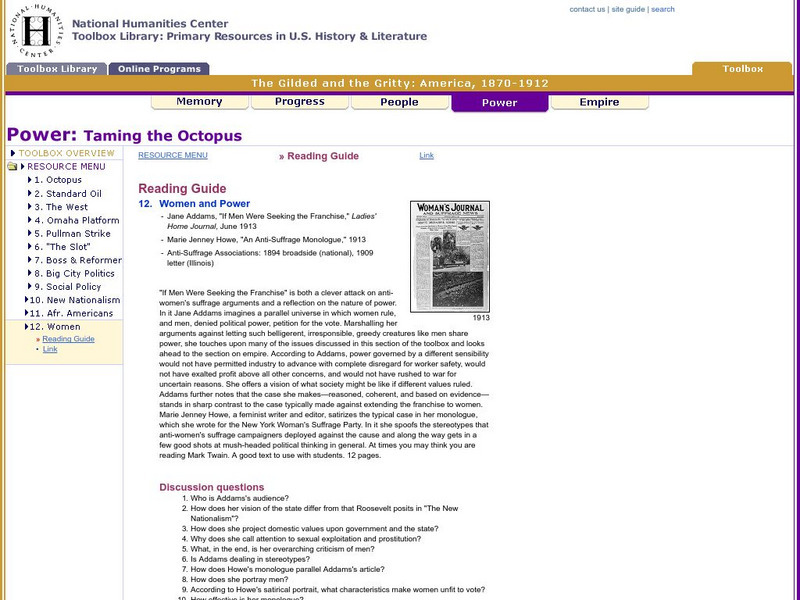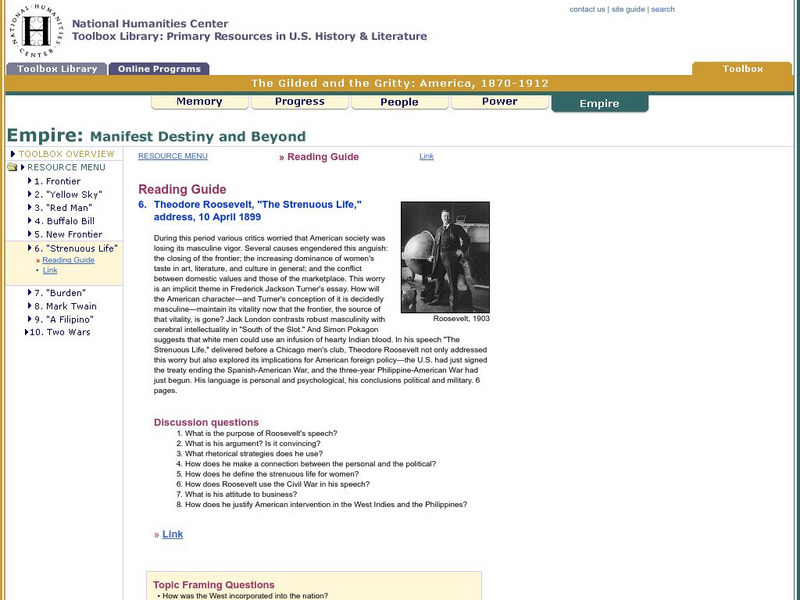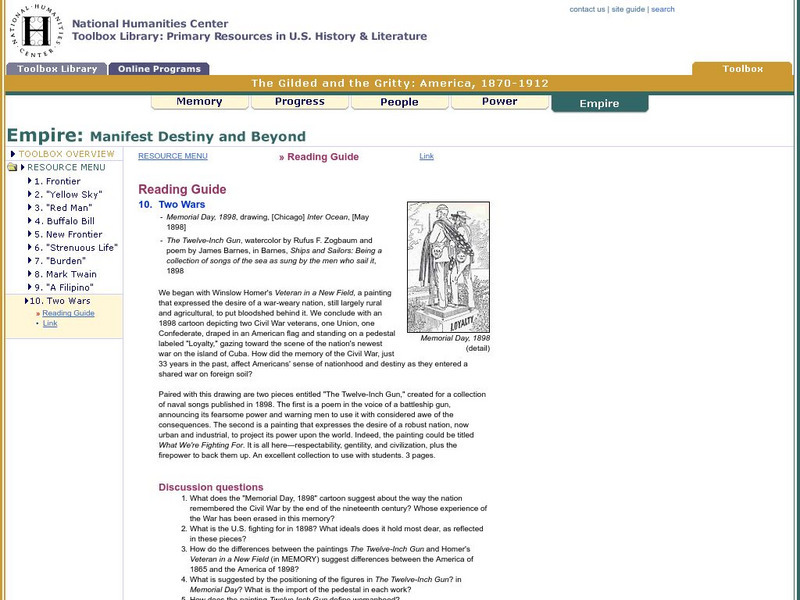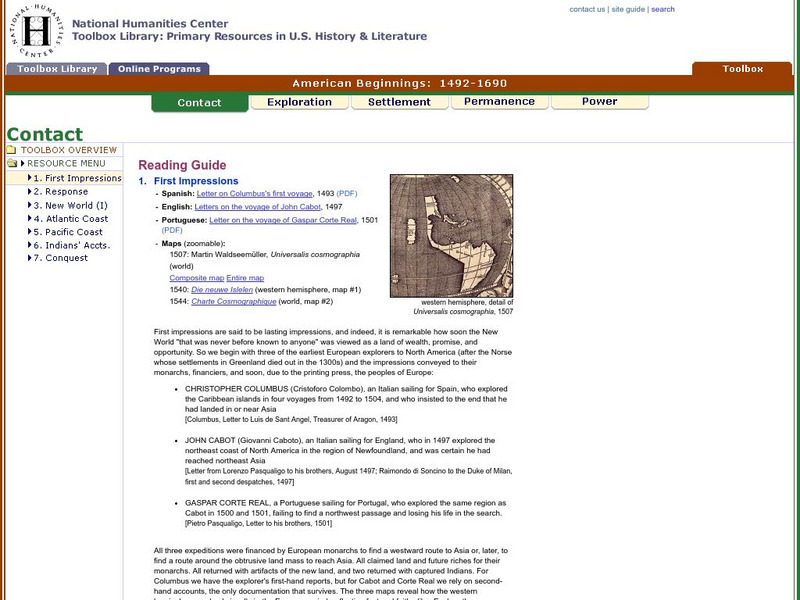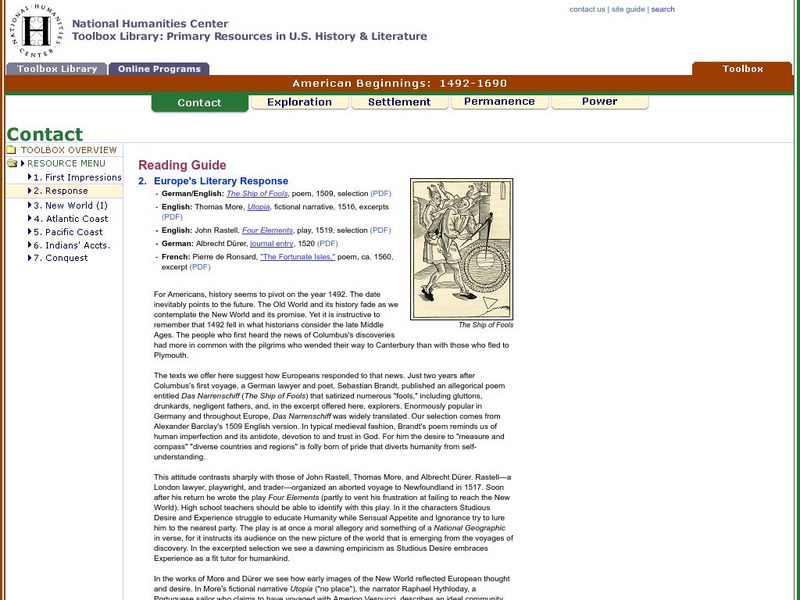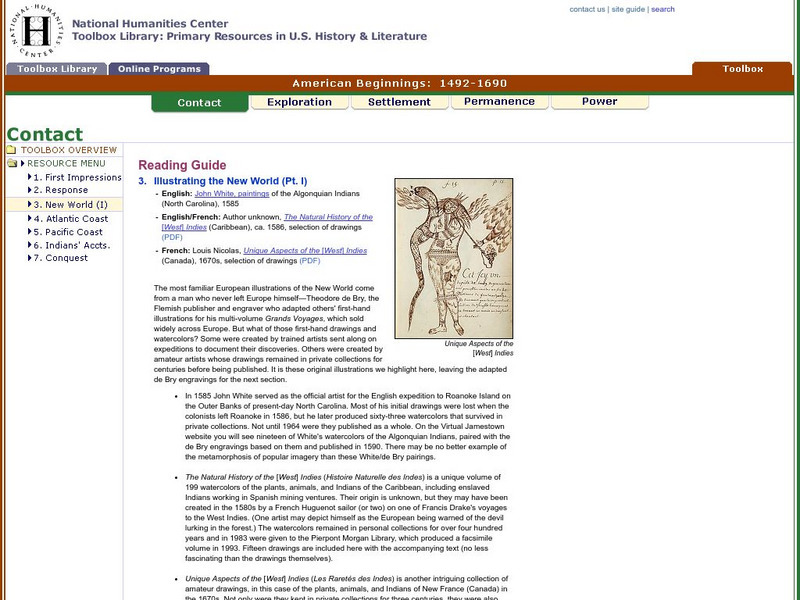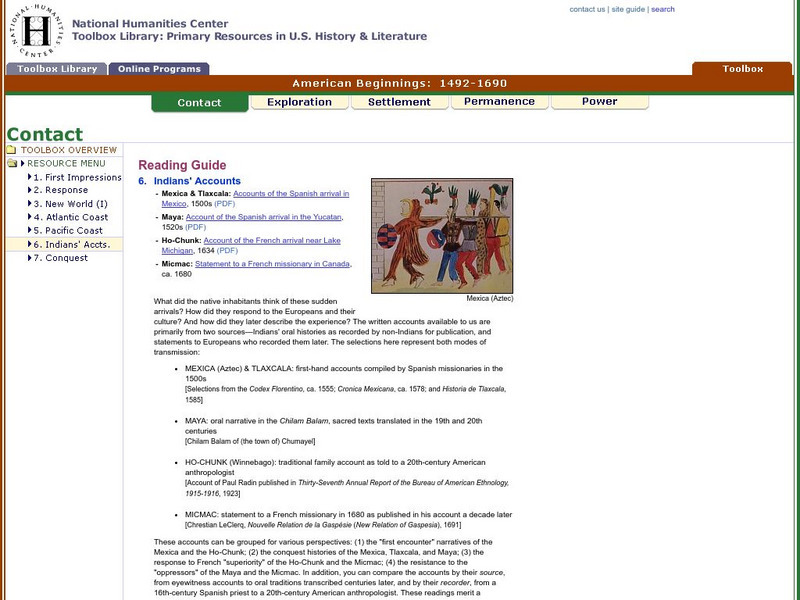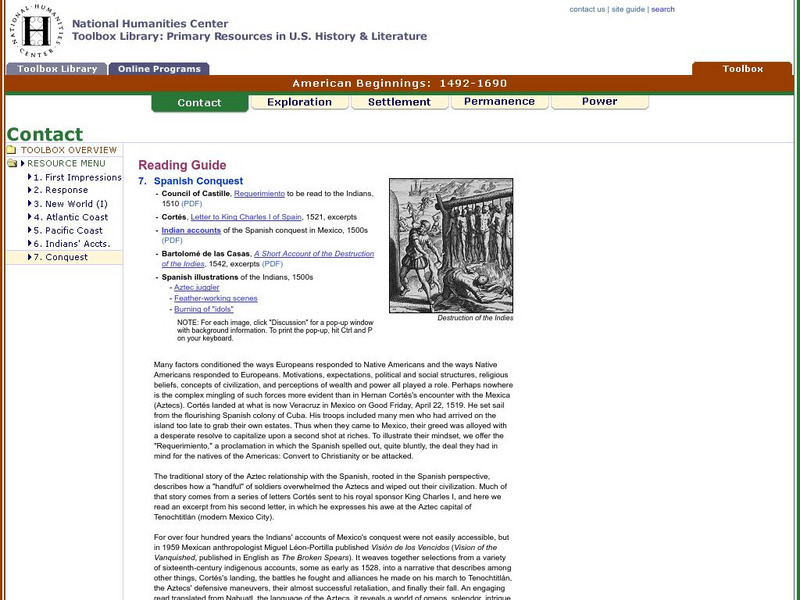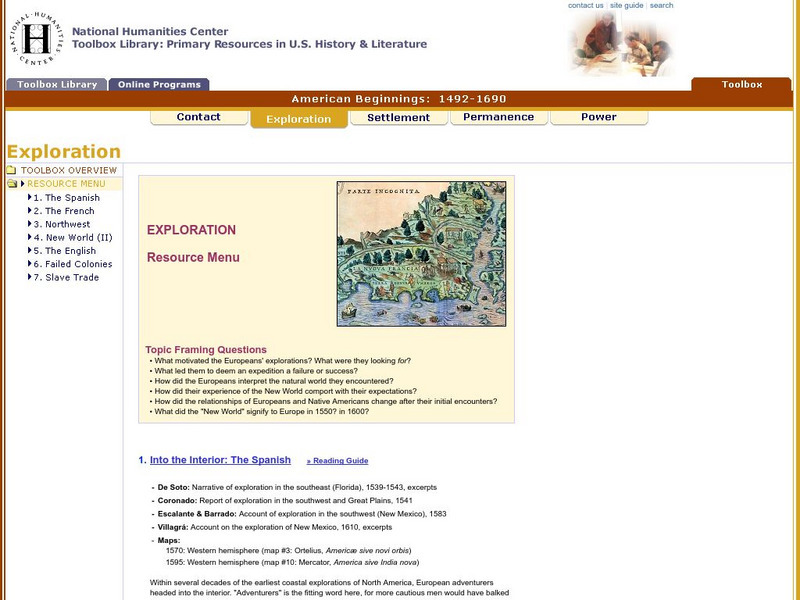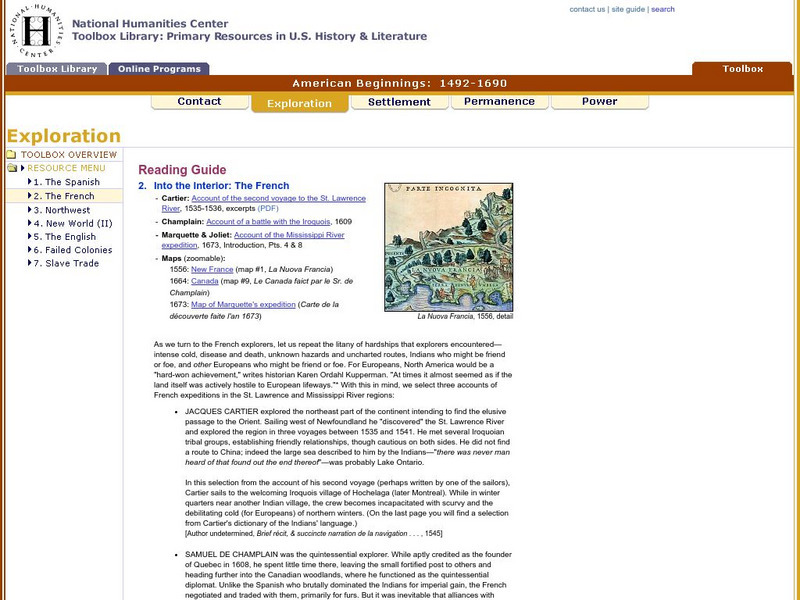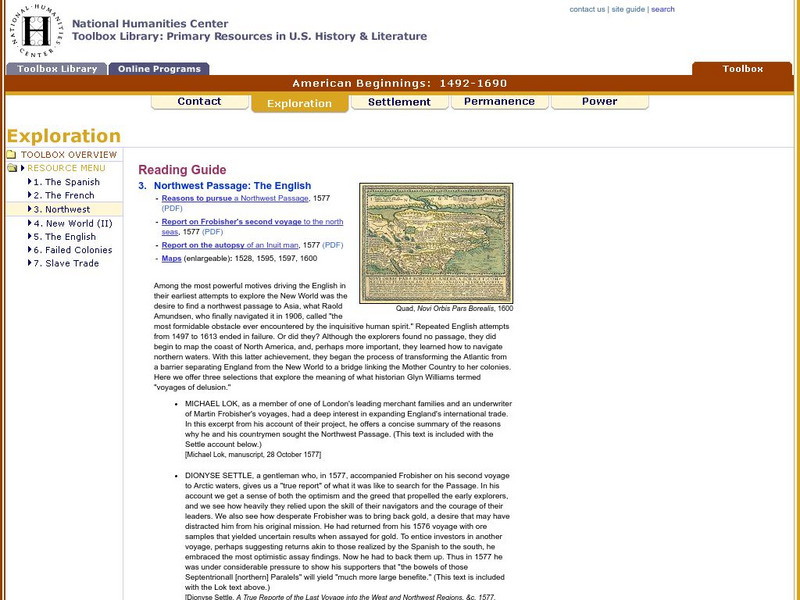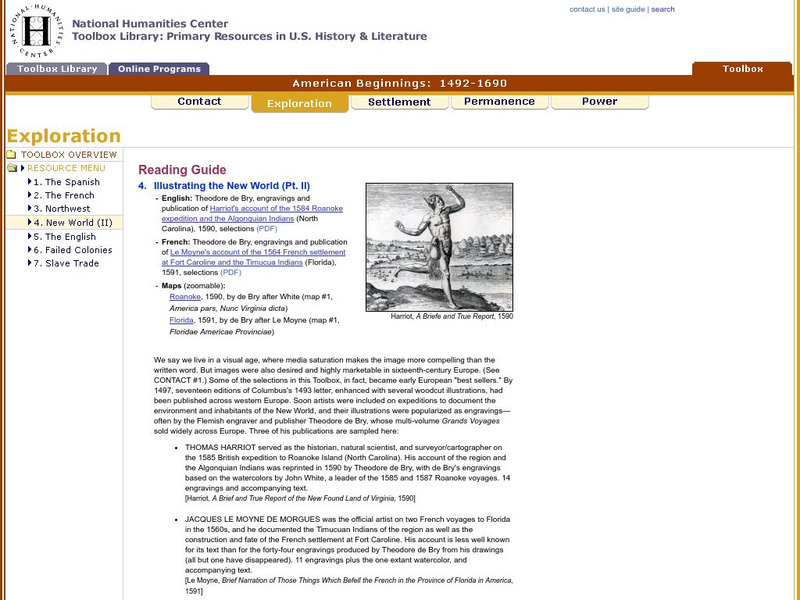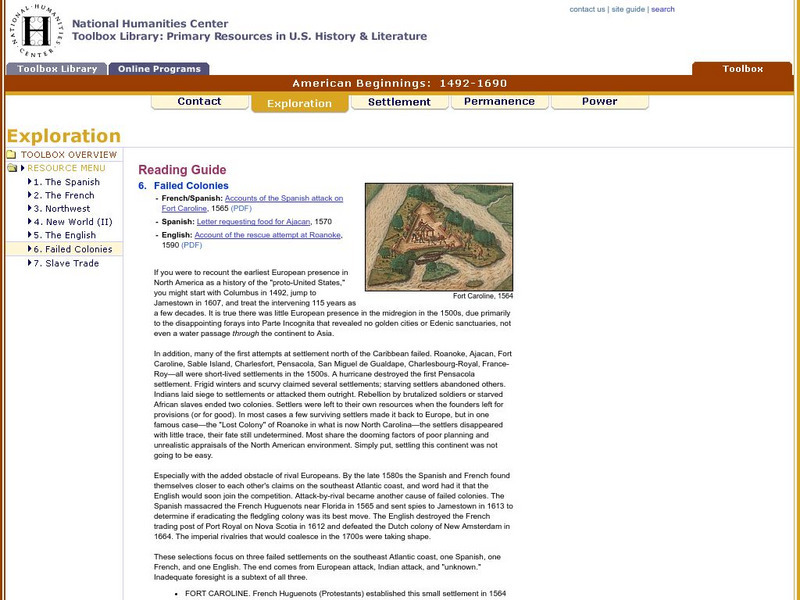National Humanities Center
National Humanities Center: Toolbox Library: Women, the Gilded and the Gritty: America, 1870 1912
Arguments by women for and against the extension of the vote to women. This resource primarily focuses on, "If Men Were Seeking the Franchise," by Jane Addams, used to project domestic values upon government and the state.
National Humanities Center
National Humanities Center: Toolbox Library: Frontier, the Gilded and the Gritty: America, 1870 1912
Arguably the most famous essay every written about the impact of land on American history, Frederick Jackson Turner's "The Significance of the Frontier in American History" explains how Americans' relationship with the environment shaped...
National Humanities Center
National Humanities Center: Toolbox Library: "Yellow Sky," the Gilded and the Gritty: America, 1870 1912
This resource by the National Humanities Center features a short story, "The Bride Comes to Yellow Sky", by Stephen Crane about the closing of the American frontier.
National Humanities Center
National Humanities Center: Toolbox Library: "Red Men," the Gilded and the Gritty: America, 1870 1912
Photographs of Native Americans and an essay that notes just how assimilated Native Americans had become in Christian America.
National Humanities Center
National Humanities Center: Toolbox Library: Buffalo Bill, the Gilded and the Gritty: America, 1870 1912
A program from the Buffalo Bill Wild West show that depicts the thrills of the American West and illustrates how American influence was spreading beyond the nation's borders.
National Humanities Center
National Humanities Center: Toolbox Library: Manifest Destiny and Beyond: Theodore Roosevelt and the Strenuous Life
Theodore Roosevelt's speech to a Chicago men's club in which he advocates a vigorous and assertive relationship between America and other parts of the world.
National Humanities Center
National Humanities Center: Toolbox Library: "Burden," the Gilded and the Gritty: America, 1870 1912
This site includes poems and editorials, some of which that praise, others that harshly condemn what Rudyard Kipling asserted was the "White Man's Burden."
National Humanities Center
National Humanities Center: Toolbox Library: Mark Twain, the Gilded and the Gritty: America, 1870 1912
Two essays by Mark Twain that condemn American foreign expansion and the immorality of imperialism. Includes questions for discussion.
National Humanities Center
National Humanities Center: Toolbox Library: Two Wars, the Gilded and the Gritty: America, 1870 1912
A political cartoon depicting a Union and a Confederate veteran united in support for the Spanish-American War. A painting entitled Twelve-Inch Gun depicting elegant officers and ladies aboard a battle ship, civilizing gentility and the...
National Humanities Center
National Humanities Center: Toolbox Library: Contact, American Beginnings: 1492 1690
Thirty one primary sources including historical documents, literary texts, and visual images from which to explore European reactions to the land and the people of the New World and the Natives' responses to European contact and conquest.
National Humanities Center
National Humanities Center: Toolbox Library: Contact: First Impressions
English, Spanish, and Portuguese maps and letters of about the voyages of Christopher Columbus, John Cabot, and Portuguese explorer, Gaspar Corte Real, which describe impressions of the lands explored.
National Humanities Center
National Humanities Center: Toolbox Library: Response, American Beginnings: 1492 1690
Five literary responses to exploration and discovery-poems, fictional accounts, a play, and journal entries-that reflect European desire, frustration, and enchantment with the New World.
National Humanities Center
National Humanities Center: Toolbox Library: New World: Part I: American Beginnings: 1492 1690
A variety of paintings and drawings that display European images of their first encounters with the land, plants, animals, and native peoples of the western hemisphere. With questions for discussion.
National Humanities Center
National Humanities Center: Toolbox Library: Atlantic Coast, American Beginnings: 1492 1690
Primary resources for U.S. history and literature offer a French and a Norse account of the earliest documented exploration on the Atlantic coast of North America and encounters with native peoples. Includes questions for discussion.
National Humanities Center
National Humanities Center: Toolbox Library: Pacific Coast, American Beginnings: 1492 1690
Primary resources for U.S. history and literature offer two excerpts from the explorations of the Pacific coast by Sir Francis Drake and Vitus Bering as well as maps drawn to reflect those journeys. Includes questions for discussion.
National Humanities Center
National Humanities Center: Toolbox Library: Indians' Accounts, American Beginnings: 1492 1690
Four accounts by Native Americans of their complex responses to and reactions toward European explorers near present-day Canada and Mexico.
National Humanities Center
National Humanities Center: Toolbox Library: Conquest, American Beginnings: 1492 1690
A series of illustrations and accounts of Spanish conquest of Indians that reflect the fascination with and the brutality directed against native cultures.
National Humanities Center
National Humanities Center: Toolbox Library: Exploration, American Beginnings: 1492 1690
Thirty two primary sources-historical documents, literary texts, and visual images-that explore the expectations and the realities of European exploration of the New World.
National Humanities Center
National Humanities Center: Toolbox Library: The Spanish, American Beginnings: 1492 1690
Two maps and four accounts of the Spanish exploration of North America that reflect the goals of the conquistadors and fascination with the land they examined-and the brutality of their treatment of native peoples.
National Humanities Center
National Humanities Center: Toolbox Library: The French, American Beginnings: 1492 1690
Three maps reflecting French exploration along rivers in North America and three French explorers' accounts of the astonishing hardships they endured and the possibilities for trade with natives they opened.
National Humanities Center
National Humanities Center: Toolbox Library: Northwest Passage, American Beginnings: 1492 1690
Four maps examining the hunt for a Northwest Passage and three English accounts detailing the curiosity, greed and optimism that fueled English exploration of North America.
National Humanities Center
National Humanities Center: Toolbox Library: New World: Part Ii, American Beginnings: 1492 1690
Two European maps of Florida and Roanoke, and a British and a French account-with associated engravings of these settlements-that promote a European interpretation of and claim over these areas.
National Humanities Center
National Humanities Center: Toolbox Library: The English, American Beginnings: 1492 1690
Six poems written by navigators and included by George Peckham, and Richard Hakluyt's argument to promote British settlement in North America. Both documents were directed to Queen Elizabeth I in an effort to promote British involvement...
National Humanities Center
National Humanities Center: Toolbox Library: Failed Colonies, American Beginnings: 1492 1690
Three European accounts of the disappointments, challenges, and outright failures to establish early successful colonial outposts in North America.
